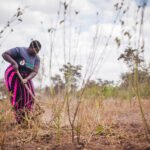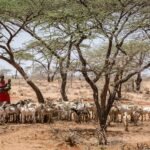A farmer with the KingaKUU cassava. Photo Credit: KingaKUU
By Murimi Gitari, November 10, 2025, A revolutionary genetically modified cassava variety, KingaKUU, is poised to reshape the agricultural landscape across East Africa, offering new hope to smallholder farmers grappling with crop losses and food insecurity.
Engineered to resist two of the region’s most destructive cassava diseases, Cassava Brown Streak Disease (CBSD) and Cassava Mosaic Disease (CMD), KingaKUU has emerged from over a decade of collaborative research and field trials as a resilient, high-yielding solution.
Led by the Kenya Agricultural and Livestock Research Organization (KALRO), the development of KingaKUU involved a consortium of institutions including the University of Nairobi, ISAAA AfriCenter, the International Institute for Tropical Agriculture (IITA), and partners from Uganda, Rwanda, and the United States.
Since 2011, the varieties have been tested in diverse agro-ecological zones such as Kandara, Mtwapa, and Alupe, demonstrating consistent resistance and productivity.
Cassava, Kenya’s second most vital food crop after maize, plays a critical role in both household nutrition and industrial applications. KingaKUU’s enhanced disease resistance is expected to safeguard yields, stabilize farmer incomes, and support industries producing animal feed, starch, flour, and ethanol—key components of Kenya’s manufacturing agenda.
The Environmental and Social Impact Assessment (ESIA) report, conducted under the Environmental Management and Co-ordination Act (Cap. 387), affirms that KingaKUU cassava presents no altered risk to the environment, human, or animal health when compared to conventional varieties. It found no significant environmental hazards or health concerns, confirmed the safety of KingaKUU cassava for both food and feed, and noted that the crop does not display invasive traits or pose a risk of cross-pollination.
Furthermore, its cultivation is deemed compatible with existing land uses and surrounding ecosystems. Based on these findings, the report has recommended that the National Environment Management Authority (NEMA) grants a permit for commercialization, emphasizing the variety’s potential to enhance smallholder livelihoods through improved crop protection, increased yields, and higher incomes.
NEMA is inviting public input on the ESIA report for the proposed commercialization of KingaKUU cassava across 18 counties, including Lamu, Kilifi, Kwale, Taita Taveta, Makueni, Kitui, Machakos, Tharaka Nithi, Embu, Nakuru, Baringo, Kakamega, Bungoma, Busia, Vihiga, Kisumu, Migori, and Homabay.
Comments can be submitted until 20th November 2025 via email to dgnema@nema.go.ke, referencing NEMA/ENVIS/SR/00083. The full report is available on the NEMA website (www.nema.go.ke).







